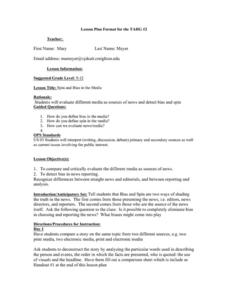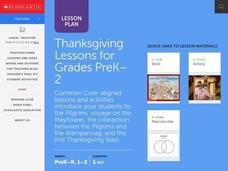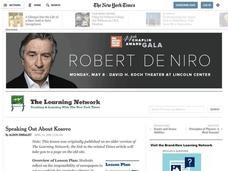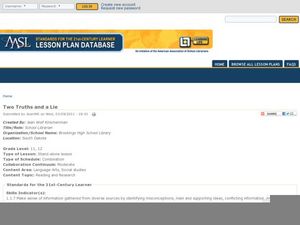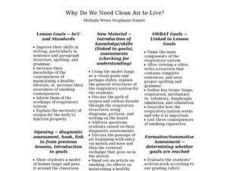Curated OER
The Atomic Bomb Dilemma
Students examine consequences of using atomic bomb in light of resulting peace, distinguish between fact and opinion and analyze sources to recognize bias and points of view, and assume role of reporter, critic, cabinet member, or...
Curated OER
Goggle Eyes
In this Google Eyes worksheet, students read eight chapters from Google Eyes and then complete a comprehension exercise, speech marks, persuasive writing, fact and opinion, question mark, and the comma worksheets. Students answer one...
Curated OER
Osage, Legend, and Arkansas History
Elementary schoolers evaluate the legend of Norristown Mountain by looking at facts about the Osage Indians and the legend itself. They do an exploration of Arkansas' Native American groups which includes a look at their legends,...
Curated OER
Men of Steel
Students explore early 20th century steel making. In this U.S. history steel making activity, students view and describe a postcard and a picture depicting exaggerated aspects of the steel industry. Students listen to a poem about Joe...
Curated OER
Spin and Bias in the Media
High schoolers compare different types of media. In this media comparison lesson, students will assess the where all types of media gets its information by viewing a video of a news story and critiquing it.
Scholastic
Thanksgiving Lessons Grades PreK-2
A quintessential resource for teaching an elementary unit on the first Thanksgiving addresses a variety of skills, including informational reading, critical thinking, comparing and contrasting facts, technology tools, and historical...
Curated OER
bbc news: school report
In this journalism worksheet, students choose a subject for a news report. They create a list of three people they would like to interview. They write 3 questions to ask, and indicate if the question relates to a fact or opinion.
Curated OER
Observation
Students study the different kinds of observation: fact and opinion. For this observation lesson students complete an activity that allows them to use their senses to make observations.
Curated OER
HOT TOPICS OF THE MISSISSIPPI
Students use a five-step process to write a persuasive essay about an issue that is related to the Mississippi River. Students build an argument based on prior knowledge and information from a variety of sources. Students base their...
Curated OER
Weave a Web of Words
Fifth graders write a first draft of an oral presentation about the American Revolution and take their work through the writing process.
Curated OER
Like It Or Not?
Write a review of the film adaptation of Holes. After viewing the film, your young reviewers make recommendations about viewing the film. Using details to support their opinions, they highlight the important parts of the movie without...
EngageNY
TASC Transition Curriculum: Workshop 12
How can opinions slant facts? Workshop participants learn how to examine primary and secondary sources and identify the author's point of view. They also examine how visual art impacts the meaning and rhetoric of sources. Full of...
Equality and Human Rights Commission
Influencing Attitudes
Does propaganda—like that used during the first World War—exist today? The 11th lesson in a series of 12 highlights the role of media when it comes to influencing attitudes. Scholars learn about sensational headlines, misrepresentation...
Curated OER
Speaking Out About Kosovo
Invite your class to reflect on the responsibility of newspapers to act as vehicles for citizens to voice their opinions. Using an article to gain factual info. about gov't strategies in dealing with current events in Kosovo, students...
Curated OER
A Colony is Born : Lesson 5 - Dear Mem
Discover colonies! Young historians will listen to a primary source journal entry read aloud with a backdrop of wave sounds. They discuss the entry, add historical facts to a chart and personal insights to another. Then they listen to...
Curated OER
Two Truths and a Lie: Internet Research Skills
It's tough for high schoolers to assess what is a credible resource and what is not. A helpful resource prompts class members to research a particular topic and record two facts—and create one lie—while documenting the sources. They then...
Chandler Unified School District
Satire: The Art of Indirect Persuasion
A free press is entitled to its opinions. While the news pages report the facts of events, editorial pages feature writers' and cartoonists' opinions about events to either directly or indirectly persuade. Introduce viewers to the art of...
Curated OER
Why Do We Need Clean Air to Live? - Biology Teaching Thesis
Students name the main components of the respiratory system. They write a reaction that contains complete sentences, and uses proper spelling and grammar, after viewing a video. Students define the following terms: lungs, respiration,...
Curated OER
Keeping Your Heart in Good Shape: What are the Benefits? - Biology Teaching Thesis
Learners name the main parts of the heart and what events occur there. They write a reaction that contains complete sentences, and uses proper spelling and grammar, after viewing a video. Students define the following terms: contraction,...
Curated OER
The Quilting Connection....a Teaching Unit on Slavery, the Underground Railroad And Quilting
Students research the Internet, read designated books and selection, participate in discussions and write short reports while completing this series of lessons about slavery and the Underground Railroad. As a final project, they design a...
Curated OER
Reporting Live from the Twentieth Century
Students create a news story on one of the top 100 news stories of the 20th century.choose one past news event. They write a news story about that event, and provide a continuation of the story based on their research.
Global Oneness Project
The Consciousness of Nature
Scholars voice their opinions about animal consciousness with an article that challenges common ideas about nature. After reading the article, learners engage in a thoughtful discussion before writing out their arguments in a persuasive...
Curated OER
Why A Bill of Rights?
Examine conflicting viewpoints in this lesson, in which middle schoolers write their own proposal for including a Bill of Rights in the Constitution. As a class, they discover how the Bill of Rights was not a planned document to be...
Curated OER
Columbus: Hero or Villain?
Students explore Christopher Columbus's motives. In this character education lesson plan, students research Internet and print sources regarding the life and actions of Christopher Columbus in order to write essays that his actions as...






